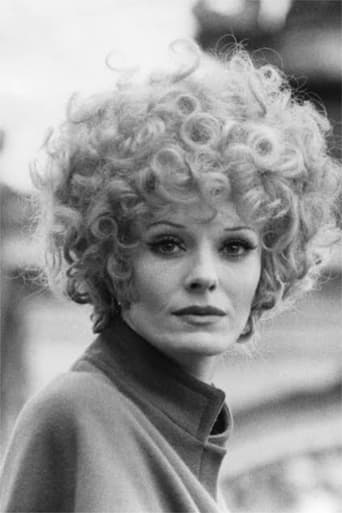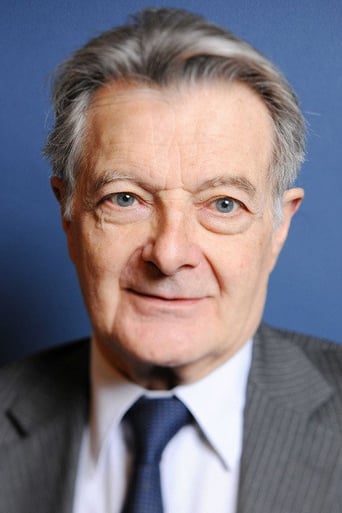MamaGravity
good back-story, and good acting
Afouotos
Although it has its amusing moments, in eneral the plot does not convince.
Gurlyndrobb
While it doesn't offer any answers, it both thrills and makes you think.
Kirandeep Yoder
The joyful confection is coated in a sparkly gloss, bright enough to gleam from the darkest, most cynical corners.
Mike Olson
Slow burn relationship drama, an old relationship renewed and examining current relationships; lovers, family... The title of the film itself seems a play on words as it's less a take-your-pick affair than it is saying the film is about these two things, connected but because the characters share connections in the present day.Here again we see Resnais exploring themes of time and memory as was the case with his previous two feature films: Last Year At Marienbad and Hiroshima Mon Amour. This, his third feature, reflects on times past, the characters talk about the past, but it doesn't go into filmed flashbacks or creative revisiting, looping back on itself, adding or changing subtle details. Memory does also come into play. With the one side of the two stories it's two characters with a shared past, of which one asks why this, how come, what were you thinking then...the other attempts to answer. But it remains elusive, a story told in pieces. Hard to assimilate as we aren't really shown enough connect-the-dot details of a shared past so much as we are just shown they had a shared past and make of it what you will. This approach can wear thin...it lacks cohesion and as a consequence comes up short on dramatic tension. The other part of the story also looks to the past, also fragmented and elusive.Early on the sound score, arriving at specific points, provides more than emphasis or support as it temporarily lends an air of mystery or sly menace that wouldn't necessarily be noticed at all otherwise. Neat trick in the way it suggests unsettled feelings or hints at perhaps darker revelations to come, something I didn't get from the dialogue alone. It too is another piece. There is other symbolism to be found, a gun shown disassembled, in pieces...At a couple points the film goes into quick edits. A single line of dialogue, jump to another scene and another line. On and on. More little pieces. It may have seemed a clever film editing technique at the time but the dialogue as presented is disconnected, unfocusing the passage of time with muddled glimpses. Which may have been the point but more than anything I found it to be somewhat annoying.Enough. The film is an exercise in patience. For me, too much so because, even though it comes to some conclusions, in the end I didn't feel it was enough to justify the scattered approach of uncertain reflections and eventual points made. Even though from the same time period, I don't feel this film is in the same class as the Resnais films Marienbad and Hiroshima, two films that are masterpieces or nearly so. You could say the approach with Muriel is radical, as was the case in those two previous films, but that doesn't, in and of itself, make it a great film. In my opinion, yours may differ.
gavin6942
In the seacoast town of Boulogne, Hélène sells antique furniture, living with her step-son, Bernard, who's back from military duty in Algiers. An old lover of Hélène's comes to visit - Alphonse - with his niece Françoise; he too is back from Algiers, where he ran a café.This was Resnais's third feature film, following "Hiroshima mon amour" (1959) and "L'Année dernière à Marienbad" (1961). The first is a classic, the second is one of my all-time favorites. This film, though, does not seem to be widely known and is the less of the three. Not bad by any means, just not on par with the two previous works.The music from Hans Werner Henze is notable and quite good, really being he highlight of the film for me. Henze is a strange and interesting figure, who worked in Germany, Italy and Cuba, but that is really neither here nor there.
jotix100
Helene, a widow living in Boulogne, France, makes a living out of selling antique furniture and objects which she uses in her own apartment. The different pieces are part of the decor. She lives with her step-son, Bernard, a recently arrival from the Algerian front. Bernard is obsessed with Muriel, a young woman that was tortured by his army unit. He is now writing his recollection of her, as well as shooting documentary style films that deal with his recent past.As the story begins, Helene had invited an old lover, Alphonse for a visit. Perhaps looking to relive the days of her first romance, she has asked him to come spend some time with her. To her surprise, Alphonse arrives with a beautiful young woman, Francoise, who he passes as his niece. It is clear from the start they know one another in a different fashion. Taking them in as her guests is a decision that backfires on Helene.Helene has a weakness for gambling at the local casino. She loses most of the time. She seems to be pressed for money. Her good friend, Roland De Smoke, appears to be a well to do man. She gets money from him, as well as from another friend, Claudie, who holds the mortgage to her apartment, probably to guarantee getting money out of what could be a possible bankrupt Helene.Alphonse, the visitor, is an enigmatic figure. He walks all over Boulogne making friends with the locals. In fact, Alphonse shows he is hiding from his own painful past. He too, has been living in Algeria managing a sort of club which he is too vague to describe. Helene, who has thought seeing her old love would lead to some change, ends up a lonely figure because nothing turns the way she had hoped."Muriel" was Alain Resnais' third full length feature. His popularity among the art house crowd was always strong, yet this film was not seen by a wider audience, as probably the producers wanted it to be. The problem might stem from the way Mr. Resnais cut the film which might lose the viewer if not paying close attention at what is happening on the screen. The scenario was written by Jean Cayrol. The film has a lot of symbolism that will elude a casual viewing. Antique furniture that equates with Helene's loneliness, a town devastated during the war, the memories of the recent Algerian conflict are part of the message Mr. Resanais wanted to project.In Delphine Seyrig, the director found a muse, no doubt. The actress appeared in the first three films of Alain Resnais. She was a serious actress who collaborated with the likes of Joseph Losey, Luis Bunuel, Marguerite Duras, among others. Her Helene is about the best thing in the film. She gave a detailed performance, giving life to a troubled soul. Jean-Pierre Kerin appears as Alphonse. Jean-Baptiste Thierree is Bernard. Nita Klein, Claude Sainval are seen in the supporting cast.
Asa_Nisi_Masa2
I had never seen an Alain Resnais movie before. Despite the fact most of my IMDb friends had told me to start off with Hiroshima Mon Amour, I was more drawn to Muriel and chose it as my first taste of Resnais. In a nutshell: it was far more interesting thematically and cinematographically (also on a purely technical level) than it was enjoyable. I'm still very glad that I saw it, though. The most fascinating aspect of it was without doubt the montage, or editing. Rather than directing or acting, or even the screen writing, it was the editing that had the lion's share of the movie, as if it were its star. I cannot think of another movie where this is quite as apparent. Some of Muriel's style of editing felt like machine-gun-fire, being so relentlessly fast and aggressive in parts, but it was in my opinion very powerful and efficient in leaving an impression of "mental flashes". This emulated the nature of memory, which is the theme at the heart of an otherwise grim and pessimistic movie. Yet this darkness is masked by an appearance of everyday banality in a provincial town, making it all the more depressing, since it's easier to relate the melancholy at its core to one's own, everyday existence. Not for nothing, the movie was also set in winter, and nothing is quite as melancholy and nostalgic as a sea-side town off-season.The last 10 minutes of the movie, more or less from the "revelation" at Hélène's Sunday lunch right to the moments in which the word "Fin" (The End) appeared on the screen, were the most powerful bout of cinematic caffeine I've experienced in a while. Until that moment I was starting to worry that the film was going nowhere too specific, or at least not somewhere that I understood or knew. Then came the final emotional earthquake, redeeming the movie tenfold, and I was virtually just as shocked as most of the characters in it.OK, I'll admit I wasn't overly enamoured of the acting. With the exception of Delphine Seyrig playing Hélène, who succeeded in convincing me with her interpretation of the character as well as making me feel sympathetic towards her, the other players left me virtually cold. For a while I thought I'd like Nita Klein playing Françoise, then I started thinking that her character was pretty much redundant and should have been far more marginal than it actually was (and what was going on between her and Bernard anyway? That felt like a contrivance). Since I mentioned Bernard, played by Jean-Baptiste Thierrée, let me say that he was the character I was least convinced by. Quite frankly, I wasn't partial to the way the actor chose to bring him to life at all. Yet he and his drama - the traumas he'd experienced during the Algerian war, his witnessing the torture of an Algerian girl, the titular Muriel, which scarred him for life - was probably the heart and kernel of the movie! Jean-Pierre Kérien playing Alphonse, is the player that most viewers here seem to criticise. In my view there wasn't much else he could have done with the character, seeing as he was mostly a pretext for Hélène's tragedy. But in the last ten minutes of the movie Alphonse's raison d'être comes sharply to the forefront, thanks to the shocking revelation previously mentioned. It was Bernard that I expected more from acting-wise, I guess. Furthermore, the soundtrack was occasionally strident and annoying, perhaps trying to be an aural version of the editing. But while it worked on a visual level, the music's jarred quality was ultimately grating.However, for the courage with which the movie tackled subjects which are best rendered in a novel form, for its successfully experimental editing, as well as its genuinely moving ending, I'll still award Muriel a pretty high score: 7.5/10 (it would have been 8 if the acting, not just from Seyrig, had been more accomplished).




